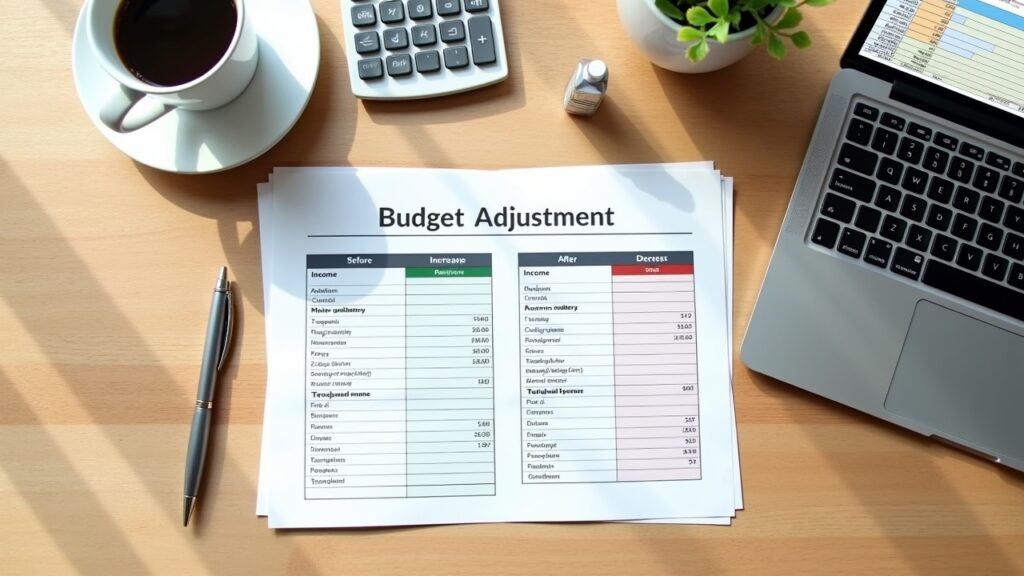Advertisements
Did you know that nearly 40% of Americans have experienced a pay cut at some point in their careers? I sure didn’t think I’d be part of that statistic until it happened to me last year! When my company announced a 20% salary reduction across the board, I felt like someone had pulled the rug out from under me.
Let me tell you, adjusting your budget after a pay cut isn’t just about cutting back on lattes (though that helps). It’s about completely reimagining your financial life while keeping your sanity intact. Trust me, I’ve been there, done that, and somehow managed to come out stronger on the other side.
The Initial Shock: What to Do When the News Hits

When my boss called me into that dreaded meeting, my first instinct was panic. Then anger. Then more panic. Sound familiar?
Here’s what I learned: take a deep breath first. Seriously, just breathe. Your immediate reaction matters less than your next steps.
I made the mistake of immediately texting my wife about canceling our vacation and selling the car. Bad move! Instead, give yourself 24-48 hours to process before making any drastic decisions. During this time, gather all your financial documents – bank statements, bills, subscriptions, everything.
Creating Your New Budget Blueprint
Okay, so here’s where the rubber meets the road. I spent an entire weekend with a budgeting app and way too much coffee, mapping out every single expense.
Start by listing your absolute necessities:
- Housing costs (rent/mortgage)
- Utilities
- Insurance premiums
- Minimum debt payments
- Basic groceries
- Transportation
Everything else? That’s negotiable. And I mean everything – from your Netflix subscription to that gym membership you barely use anyway.
One trick that saved my bacon was the 50/30/20 rule, modified for crisis mode. With my reduced income, I shifted to more like 70/20/10 – needs, wants, and savings. Not ideal, but temporary!
Slashing Expenses Without Losing Your Mind
Here’s where things got real interesting (and by interesting, I mean challenging as heck). I had to cut $800 from our monthly budget.
First up was our grocery bill. We switched from shopping at fancy organic stores to discount grocers. The quality surprised me – we’re still eating well, just smarter. Meal planning became my new Sunday ritual.
Then came the subscription audit. You know how many random subscriptions we had? Seventeen! From streaming services to that wine club I’d forgotten about. Cutting these saved us $200 monthly.
Transportation was trickier. We considered going down to one car but realized the inconvenience wasn’t worth the savings. Instead, I started carpooling twice a week and working from home more often.
Finding Hidden Money in Your Current Situation
This might sound crazy, but a pay cut forced me to discover money I didn’t know I had. No, I didn’t find cash in the couch cushions (though I did find $3.47).
I called every service provider – insurance, phone, internet – and negotiated lower rates. Most companies have retention departments that’ll work with you if you’re polite but firm. This alone saved us $150 monthly!
We also did a massive declutter and sold stuff on Facebook Marketplace. Old electronics, furniture we never used, clothes with tags still on them. Made almost $1,000 in two months!
Building Multiple Income Streams (Even When You’re Exhausted)

Look, I know the last thing you want after a pay cut is to work more. But hear me out – small side hustles can make a huge difference.
I started freelance writing on weekends, just 5-10 hours. Nothing fancy, mostly blog posts for small businesses. The extra $500-800 monthly literally saved our emergency fund.
My wife picked up tutoring gigs online. She only does 3-4 hours weekly but brings in another $200. Every little bit counts when you’re rebuilding!
The key is finding something that doesn’t burn you out. We tried food delivery but hated it. Find what works for your lifestyle and energy levels.
Your Financial Recovery Roadmap
Living on a reduced income isn’t anyone’s idea of fun, but it doesn’t have to be forever. I’ve learned that financial resilience comes from adapting quickly and staying focused on what really matters.
Remember, this situation is temporary. Keep tracking your expenses, celebrate small wins (like negotiating that phone bill down!), and don’t be too hard on yourself when you slip up. I definitely bought stress donuts more than once!
Most importantly, use this as an opportunity to build better financial habits. When your income bounces back – and it will – you’ll be in a much stronger position. Start exploring more money management strategies and financial wellness tips at Cashflow Zen, where you’ll find tons of resources to help you navigate your financial journey, whether you’re dealing with a pay cut or planning for future prosperity.




[…] to transform your food budget and reduce mealtime stress? Dive deeper into money-saving strategies with more helpful tips at Cashflow Zen. Your wallet (and your family) will thank […]